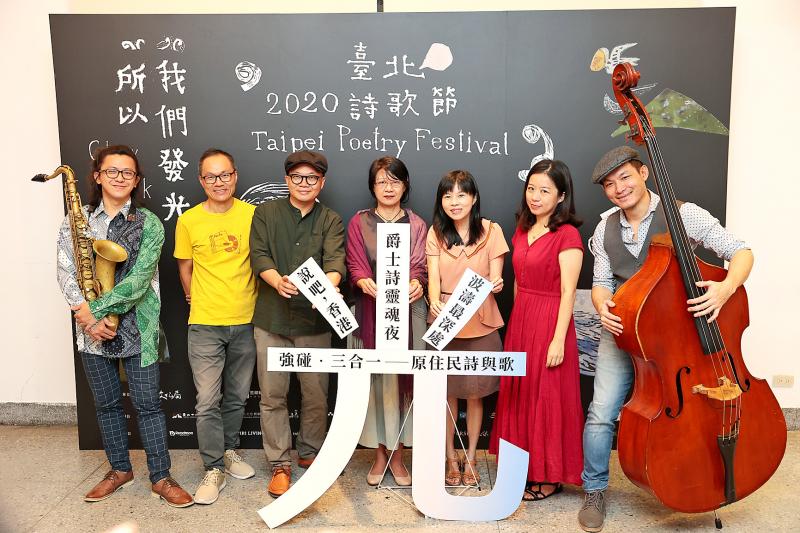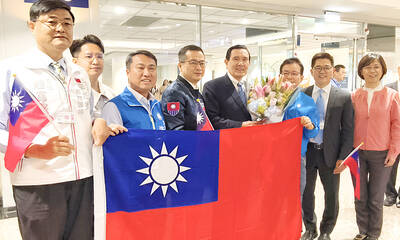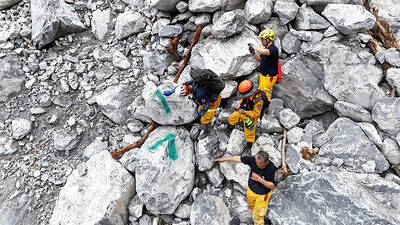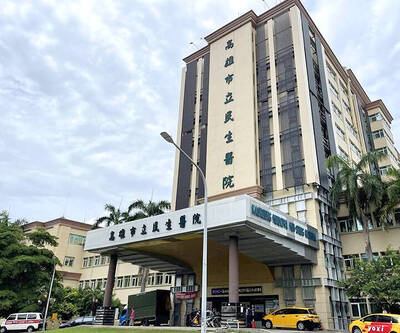This year’s Taipei Poetry Festival, themed “Glow in the Dark” (所以我們發光), is to open on Saturday, with a series of events to be held through Oct. 11.
For the opening performance, the Taipei Department of Cultural Affairs, which organizes the annual event, is to present “Speak, Hong Kong” (說吧,香港) at Taipei Zhongshan Hall’s Zhongzheng Auditorium at 7:30pm on Saturday.
“Hong Kong and Taiwan have long influenced each other in literature and popular culture, and the rapidly changing developments in Hong Kong are tied to Taiwan’s future,” organizers said.

Photo courtesy of Taipei City Government Department of Cultural Affairs
Through music, text, video and theatrical performance, artists from Taiwan and Hong Kong are to lead audiences in reflecting on important historical moments and changes in Hong Kong, and “help the audience experience Hong Kong through literature and contemplate their own future,” they said.
One of the highlights of the festival is “A Soulful Night of Jazz Poetry” (爵士詩靈魂夜), which is to be held at Zhongshan Hall’s Guangfu Auditorium at 7:30pm on Oct. 10.
Jazz music is “the most free and avant-garde” art form, and a “hotbed for nostalgia,” organizers said.
“Since the post-World War II Beat Generation, jazzy poetry has also become an important part of contemporary poetry,” they said.
For “A Soulful Night of Jazz Poetry,” jazz musicians Hsieh Min-yen (謝明諺), Vincent Hsu (徐崇育), Hsu Yu-ying (許郁瑛) and Lin Wei-chung (林偉中) are to be joined by poets Yang Ze (楊澤), Chen Chia-tai (陳家帶), A-mang (阿芒), A-tun (阿鈍), Lo Yu-chia (羅毓嘉), Tsui Shun-hua (崔舜華) and Sharon Tsui (崔香蘭).
The event would also feature special appearances by Dawang Huang (黃大旺) and Mars Lin (林理惠), organizers said.
Together, the performers would “kindle sparks between language and music,” they said.
The festival includes 10 seminars on topics including gender, disease, local culture, social movements, paintings, and the relationship between language and poetry, organizers said, adding that there would also be seminars honoring poets Yang Mu (楊牧) and Shoo Tao (秀陶), both of whom passed away this year.
Two of the seminars would be presented by Chang Fang-tzu (張芳慈), one of the leading figures of contemporary Hakka literature, and the festival’s keynote poet this year, they said.
Chang and poet Tung Shu-Ming (董恕明) are to share their experiences exploring the individual and the collective in their writings at “My / Our Singing” (我/們的歌唱) at Kishu An Forest of Literature at 2:30pm on Sunday.
Chang and poetry professor Horng Shu-ling (洪淑苓) are to speak about female tenacity in love and lust at “Undercurrents in Women’s Pools” (女人潭中的暗流) at Eslite Spectrum’s Songyan Store at 7:30pm on Monday next week.
Director Huang Ming-chuan’s (黃明川) documentary Deepest Uprising (波濤最深處), which highlights four female Asian poets, is to premiere at the festival, with a screening at SPOT-Taipei in Zhongshan District (中山) at 2:30pm on Oct. 11.
Poet Tsai Hsiu-chu (蔡秀菊) is to join Huang Ming-chuan for a discussion on the identities of female creators after the screening.
While this year seems to be shrouded in a kind of shadow, art and literature can often serve as the light, said festival cocurator Yang Chia-hsien (楊佳嫻), adding that she hopes that through words and other media, the festival’s artists can bring light to others.
For more information, visit poetryfestival.taipei/2020.

Former president Ma Ying-jeou’s (馬英九) mention of Taiwan’s official name during a meeting with Chinese President Xi Jinping (習近平) on Wednesday was likely a deliberate political play, academics said. “As I see it, it was intentional,” National Chengchi University Graduate Institute of East Asian Studies professor Wang Hsin-hsien (王信賢) said of Ma’s initial use of the “Republic of China” (ROC) to refer to the wider concept of “the Chinese nation.” Ma quickly corrected himself, and his office later described his use of the two similar-sounding yet politically distinct terms as “purely a gaffe.” Given Ma was reading from a script, the supposed slipup

Former Czech Republic-based Taiwanese researcher Cheng Yu-chin (鄭宇欽) has been sentenced to seven years in prison on espionage-related charges, China’s Ministry of State Security announced yesterday. China said Cheng was a spy for Taiwan who “masqueraded as a professor” and that he was previously an assistant to former Cabinet secretary-general Cho Jung-tai (卓榮泰). President-elect William Lai (賴清德) on Wednesday last week announced Cho would be his premier when Lai is inaugurated next month. Today is China’s “National Security Education Day.” The Chinese ministry yesterday released a video online showing arrests over the past 10 years of people alleged to be

The bodies of two individuals were recovered and three additional bodies were discovered on the Shakadang Trail (砂卡礑) in Taroko National Park, eight days after the devastating earthquake in Hualien County, search-and-rescue personnel said. The rescuers reported that they retrieved the bodies of a man and a girl, suspected to be the father and daughter from the Yu (游) family, 500m from the entrance of the trail on Wednesday. The rescue team added that despite the discovery of the two bodies on Friday last week, they had been unable to retrieve them until Wednesday due to the heavy equipment needed to lift

MIX-UP: Kaohsiung Municipal Min-Sheng Hospital director Yen Chia-chi was suspended from his duties after surgeons operated on the wrong patient last week The Kaohsiung Department of Health yesterday fined Kaohsiung Municipal Min-Sheng Hospital NT$500,0000 for misidentifying two patients and consequently causing one of them to undergo the wrong surgery last week. The hospital’s director Yen Chia-chi (顏家祺) was suspended from his duties. The surgeon who was scheduled to operate on the patient was given a major demerit and is subject to subsequent disciplinary actions. Demerits were given to the anesthesiologist, the nurse in the operation room, the nurse in the ward and the worker who helped transfer the patient from the ward to the operation room for having failed to verify the patient’s identity. Meanwhile, the